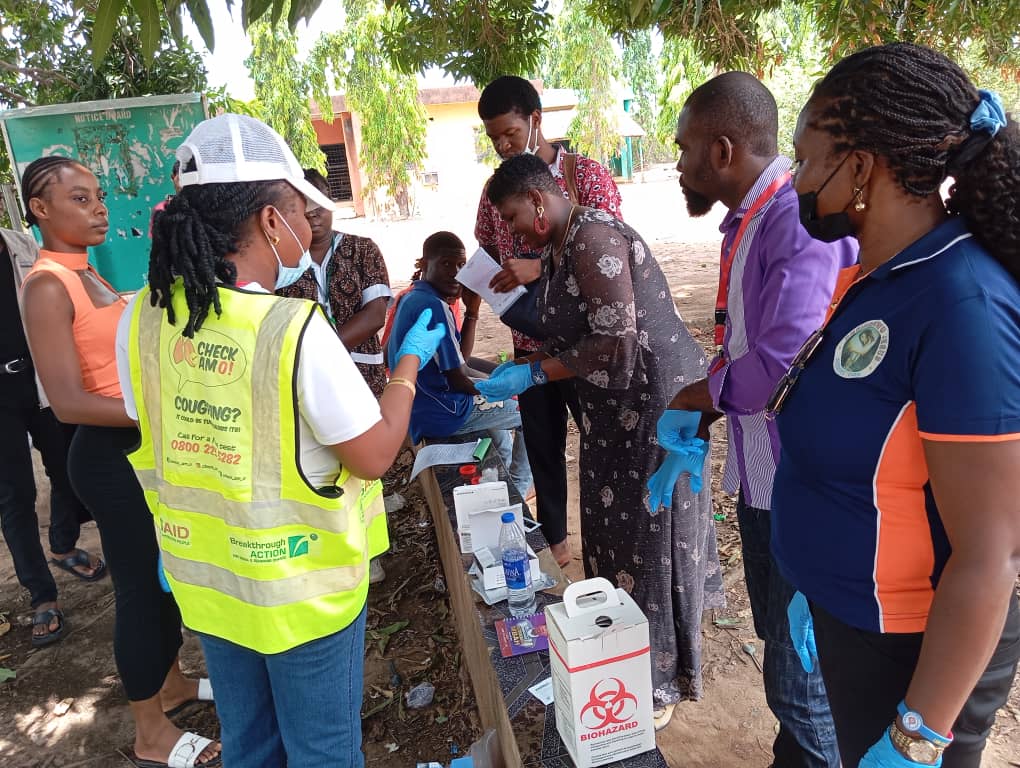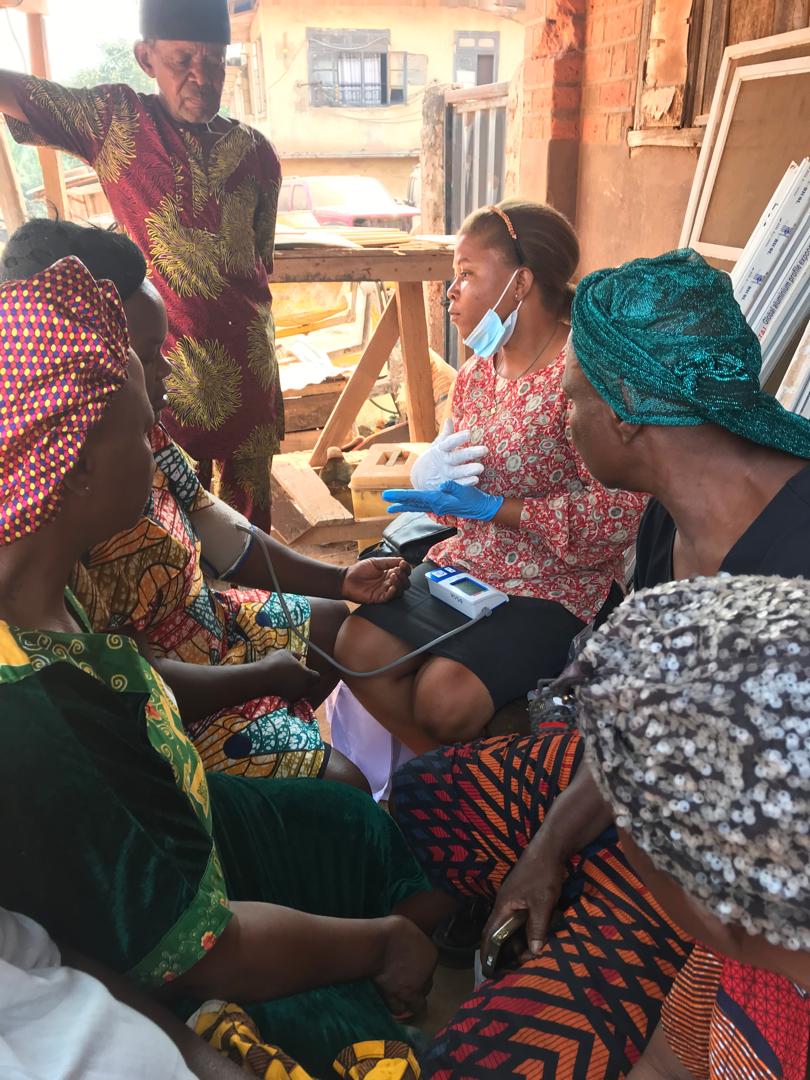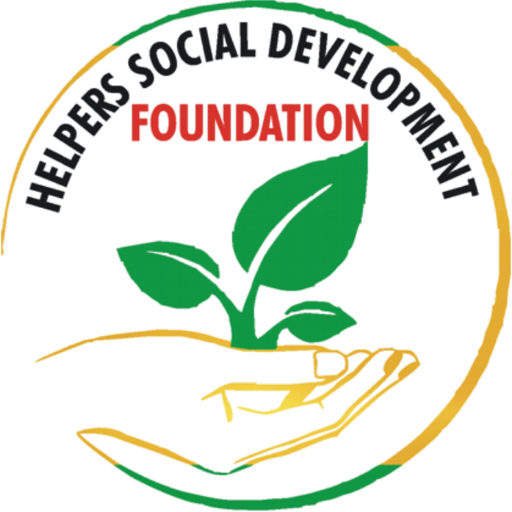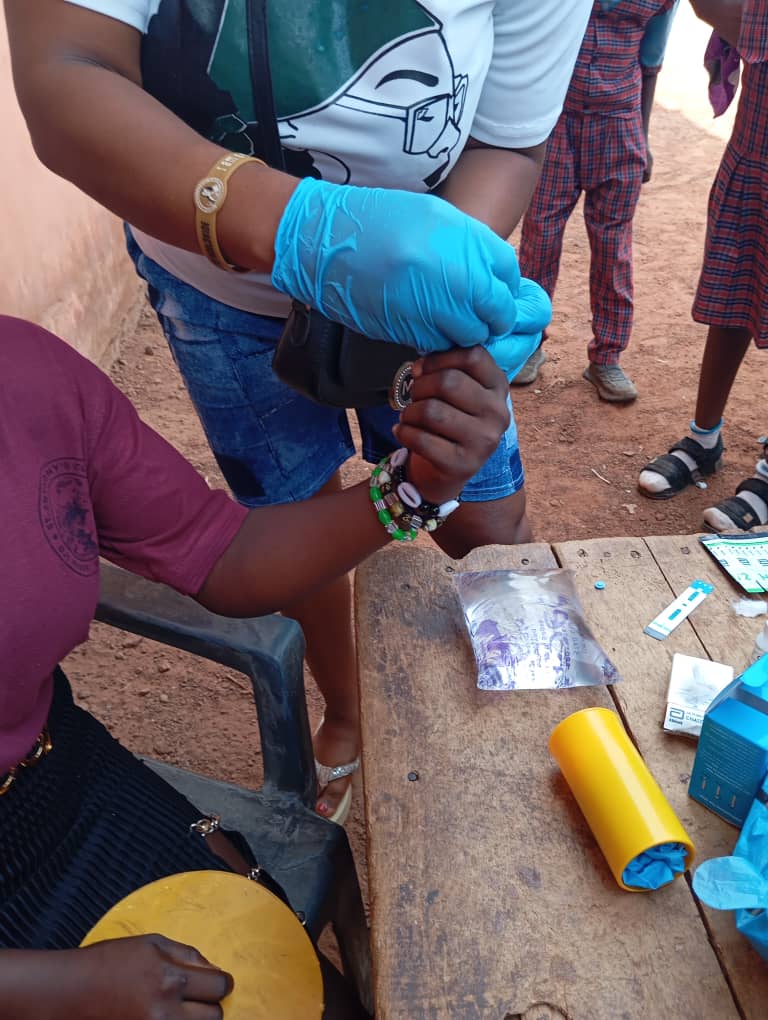 One Town at a Time: Eradicating the Transmission of HIV/AIDS in Nigeria, at Helpers Social Development Foundation, we believe that ending the spread of HIV/AIDS in Nigeria is not just possible—it’s within reach. But it will take dedicated action, community by community, town by town. As a sub-recipient of the Global Fund grant, and in partnership with Caritas Foundation Nigeria, we are implementing HIV/AIDS and Tuberculosis community screening programs in Enugu State. Our goal is clear: to stop transmission before it starts through early detection, education, and outreach.
One Town at a Time: Eradicating the Transmission of HIV/AIDS in Nigeria, at Helpers Social Development Foundation, we believe that ending the spread of HIV/AIDS in Nigeria is not just possible—it’s within reach. But it will take dedicated action, community by community, town by town. As a sub-recipient of the Global Fund grant, and in partnership with Caritas Foundation Nigeria, we are implementing HIV/AIDS and Tuberculosis community screening programs in Enugu State. Our goal is clear: to stop transmission before it starts through early detection, education, and outreach.
we are committed to protecting lives in rural communities through the early detection, prevention, and treatment of HIV/AIDS and Tuberculosis (TB). With strategic partnerships and support from donors and organizations like the Global Fund and Caritas Foundation Nigeria, we are taking impactful steps to stop the spread of these diseases—one community at a time.
The Power of Prevention HIV/AIDS and Tuberculosis: Why Screening Matters
Early testing and awareness are critical. Many people, especially in rural areas, are still unaware of their HIV and Tuberculosis status or the ways in which the virus affects their families—particularly children born with HIV and affected by TB, who often suffer in silence without access to early treatment. Our outreach teams provide:
- Free HIV and TB screenings
- Health education sessions
- Counseling and referral services
- Linkage to care for those who test positive
For nearly three decades, Nigeria has been involved in the fight against HIV/AIDS (Human Immunodeficiency Virus/Acquired Immunodeficiency Syndrome). In 2012, the United Nations Program and the World Health Organization (WHO) reported that the number of individuals living with HIV at the end of 2011 was 34 million, with approximately half of them unaware of their status. It is estimated that Nigeria was the site of nearly two-thirds of HIV infections in West and Central Africa in 2016. Nigeria, in conjunction with South Africa and Uganda, is responsible for nearly half of all new HIV infections in sub-Saharan Africa each year (UNAIDS, 2017; NACA, 2018). In 2023, Nigeria ranked third globally with the highest burden of HIV infection. Nigeria was responsible for nearly 70% of all new infections in West and Central Africa in 2019.
Inadequate education, poverty, socio-cultural barriers, political inertia, and a lack of adequate medical facilities are among the factors that contribute to HIV infections in the country (Awofala and Ogundele, 2018). The absence of HIV testing, particularly in rural areas, exacerbates HIV infection. HIV/AIDS has a wide-ranging and pervasive impact, affecting not only individuals and communities psychologically but also economically and socially. Families typically lose their most productive members to this disease, leaving children and elderly individuals without means of support.
among the factors that contribute to HIV infections in the country (Awofala and Ogundele, 2018). The absence of HIV testing, particularly in rural areas, exacerbates HIV infection. HIV/AIDS has a wide-ranging and pervasive impact, affecting not only individuals and communities psychologically but also economically and socially. Families typically lose their most productive members to this disease, leaving children and elderly individuals without means of support.
It has been noted that the majority of individuals with HIV present at the hospital when the disease is far advanced and frequently terminal, although awareness has been raised about the disease through a variety of media, including radio, television, postal service, and health personnel.
The vision of the Helpers Social Development Foundation (HSDF) is for Nigeria to become a nation of individuals who possess a functional understanding of HIV/AIDS. This will be achieved by ensuring that all Nigerians are informed and knowledgeable about the risks of HIV infection, how to protect themselves, how to get tested and treated, and how to eradicate the disease. The foundation’s goal is to create a society in which children, youth, and women have access to social amenities in relation to the delivery of quality health care, economic empowerment, and a sound education, regardless of their gender or religious affiliation. To achieve these goals, we have implemented and continue to implement a variety of HIV/AIDS enlightenment programs in rural communities and urban areas of Nigeria.
Why community HIV Aids screening important
HIV testing is a critical entry point to HIV prevention and treatment, and efforts are underway to achieve the first 95% of the Joint United Nations Programme on HIV/AIDS (UNAIDS) 95–95–95 targets, which aim to ensure that 95% of individuals living with HIV are aware of their status by 2030 (UNAIDS 2014; 2018). Nevertheless, in Nigeria, only 3.8% of males and 4.0% of females aged 15–19 have ever tested for HIV (Staveteig, 2013). HIV testing for young people in Nigeria is affected by several challenges, including personal fears and a low sense of risk, lack of support from friends and society, and issues like stigma and not enough testing locations. Innovative methods of delivering HIV testing services that address these barriers will be necessary to close the testing gap. This category includes targeted approaches that can reach young people who may not have tested otherwise.
HIV testing has been demonstrated to serve as a “critical gateway” to support services and treatment. Nigeria is responsible for 13% of all HIV-positive individuals and 19% of all AIDS-related deaths in sub-Saharan Africa, with a prevalence of 3.2%. The country has 3.4 million individuals living with HIV, 51,000 new child infections, and 190,000 HIV-positive pregnant women. 52,500 HIV-positive pregnant women are receiving antiretroviral therapy (ARVs), while 70% of HIV-infected pregnant women are not receiving ARVs.
Worldwide, HIV prevention and care strategies necessitate voluntary counseling and testing. HIV screening, also known as HIV is testing, is the sole method of determining an individual’s HIV status. It allows for the early initiation of treatment in the event that an individual tests positive for the virus. The fact that many individuals are unaware of their HIV infection may decrease the likelihood of them taking necessary precautions to prevent spreading the virus to others. Additionally, early diagnosis frequently leads to earlier treatment with medications that may impede the progression of AIDS. It is imperative to normalize testing and increase the number of individuals who are aware of their HIV serostatus to mitigate stigma and discrimination. In the same vein, the declaration by role models or esteemed community members that they have undergone HIV testing is crucial for the reduction of stigma and the increase in HIV testing prevalence (WHO, 2021). We have made numerous endeavors to guarantee that a significant number of Nigerians have received HIV/AIDS testing at no cost.
Access to HIV testing facilities by high-risk groups in Nigeria is limited, despite the importance of HIV testing in HIV control (Kitara et al. 2012; WHO, 2015). Currently, there are various options available for young individuals to test for HIV. Location of testing (e.g., facility-based, home-based, and mobile), HIV test type (e.g., oral HIV self-test, finger-prick HIV self-test, and health facility-based venipuncture blood test), and counseling type (e.g., telephone counseling, one-on-one counseling, and handbook counseling) are among the testing options. To guarantee that Nigerians have access to all of these testing options, HSDF need the necessary funds through donations and volunteers.
To achieve the Joint United Nations Programme on HIV and AIDS’s 2010 vision of zero new infections, it will be necessary to carefully evaluate the societal structures, beliefs, and value systems that impede the effectiveness of HIV prevention efforts (UNAIDS, 2015).
Education and Sensitization
One Town at a Time: Eradicating the Transmission of HIV/AIDS, education and stigmatization attitudes underscore the influence of education on attitudes and perceptions toward individuals with HIV/AIDS. A potential explanation for the stigmatization of individuals with HIV is a lack of understanding regarding its transmission. The low uptake of HIV testing among young people in Nigeria is partially attributed to the anticipated HIV stigma and discrimination, lack of confidentiality, and anxiety of testing outcomes. These obstacles undermine initiatives to expand HIV testing and underscore the urgent necessity of devising locally appropriate strategies, youth-centered, and preference-sensitive. Helpers Social Development Foundation (HSDF) has made strides in the elimination of these barriers by educating and sensitizing all Nigerians against the discrimination of individuals living with HIV/AIDS in partnership with Caritas Foundation. There is a necessity for additional school-based programs to promote positive sexual behaviors. Behavioral change communication can effectively accomplish this. It is imperative to enhance the current peer education programs.
In rural communities and villages, risk is influenced by differences in sexual behaviors, including transactional, casual, and sex work. Adolescents and young individuals are particularly susceptible to evolving social trends and perceptions of risk. People perceived counseling as a crucial component, as it provided the chance to promote behavioral changes and tackle the difficult emotional aspects. Such an effort is crucial for the prevention of the infection from spreading further. Counseling is the most effective method for “accelerating the adoption of a safer sex norm,” which is essential for the prevention of the disease (Odimegwu et al. 2013; Zelalem et al. 2013). Counseling has been integrated into the educational programs of Helpers Social Development Foundation (HSDF).
How you can support Helpers Social Development Foundation to stop the spread of HIV/AIDS and Tuberculosis
1. Donations & Grants
Your financial support helps us:
- Expand screenings to more villages.
- Supply testing kits, medication, and transport.
- Train more health workers and equip mobile units.
2. Corporate & NGO Partnerships for HIV AID and TB community project
We invite corporations, healthcare institutions, and NGOs to partner with us through:
- Co-branded community outreach programs.
- In-kind donations (e.g., test kits, mobile vans, digital tools).
- CSR projects focused on rural health development.
3. Volunteer or Advocate to end the spread of HIV Aids and TB in Nigeria
Lend your voice or your time. Help us reach more people and break the silence around HIV and TB in rural communities.
Together, we can build healthier communities where no child is born with HIV, and no life is lost to preventable diseases in Nigeria.
📧 To partner or donate, contact us at: partners@helpersfoundation.org or helpersfoundations@gmail.com
Conclusion
One Town at a Time: Eradicating the Transmission of HIV/AIDS counseling and testing were implemented in 1994 by the World Health Organization (WHO) and UNAIDS as a primary and secondary preventive strategy to address the distinct aspects of health promotion, early diagnosis, and treatment of the disease. This method has been demonstrated to be effective in reducing anxiety regarding the disease and reducing hazardous behaviors. The accessibility of essential healthcare services in remote and marginalized areas can be enhanced by the implementation of innovative healthcare delivery models. At Helpers Social Development Foundation (HSDF), we are making strides toward the eradication of HIV/AIDS in Nigeria. Nevertheless, we require additional volunteers and donors to contribute to our cause to ensure that Nigeria becomes HIV/AIDS-free Nation in Africa. One Town at a Time: Eradicating the Transmission of HIV/AIDS project in Nigeria

